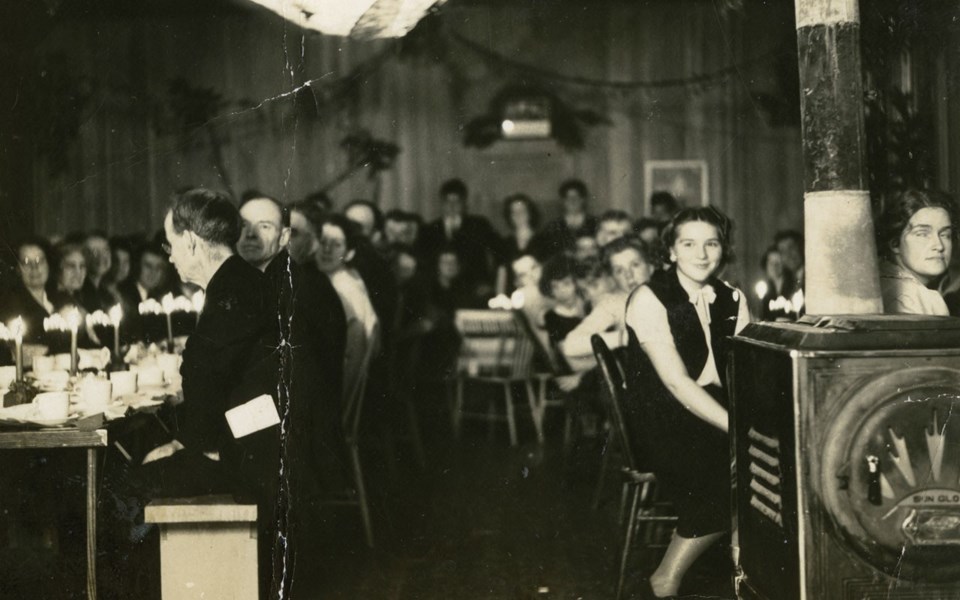In the Whistler museum collections is one photograph of a New Year's celebration held at the Alta Lake School in 1937. We don't know who all of the people in the photo are, but a few names are written on its back, including the name of Jenny Jardine. Although Jenny and her family attended social events at the school (Jenny was even in charge of the refreshments for a time), she never attended the school as a pupil. We know a lot about Jenny's life in the valley through her memoir, letters with Florence Petersen and oral history interview with the museum.
Jenny was born in Kelowna in December 1912. Her parents, Lizzie Laidlaw and John Jardine, had met aboard the ship that brought their families from Scotland to Canada and married a few years later. Jenny was their first child, followed by Jack 18 months later.
Lizzie and the children remained in Kelowna when John went to fight in the First World War, moving to Vancouver after he was wounded at Mons and sent to Vancouver General Hospital. When he was released, he found work on the Pacific Great Eastern Railway (PGE) and the family settled in Squamish.
John was killed when a speeder he was riding on collided with a train and Lizzie moved her family back to Kelowna, where their third child, Bob, was born. They soon relocated again, moving to North Vancouver where Lizzie was offered work keeping house for Thomas Neiland, a friend of John's. In 1921, the entire household moved to Alta Lake, where Neiland planned to start his own logging business.
Jenny was only eight-and-a-half years old when her family moved to Alta Lake. She had attended school in Squamish, Kelowna, and North Vancouver, but at the time there was no school at Alta Lake. She and her brother Jack were enrolled in correspondence courses, but learning by correspondence in the 1920s was frustrating, to say the least. After Lizzie married Thomas Neiland and had another son, Tom Neiland, keeping Jenny and Jack at their studies became more of a struggle. According to Jenny, however, her mother did ensure they learned how to read and that became "the road to other things."
In her memoirs, Jenny said that, during her early life at Alta Lake, most employment in the valley was "cutting railway ties, making and shipping telephone poles, prospecting, trapping, and renting a few cabins to summer visitors."
There was also some work at an iron ore operation and on the railway. By the time she was 12, Jenny was working for her step-father out in the woods, driving horses, cutting poles and ties, and hauling and piling the lumber.
Jenny met Wallace Betts through her brother Tom, who had met Betts at one of the logging camps in the area. After their marriage in 1937, Jenny and Wallace moved quite a few times, often in the Alta Lake area. They lived for a time at Parkhurst, and at the Iron Ore Spur where Jenny remembered learning to knit socks. Their first two children, Louise and Sam, were born in Vancouver but spent time with their grandmother Lizzie at her house in what is now Function Junction.
Jenny's life at Alta Lake, like that of the rest of her family, was not easy. She later wrote that as children, "We loved living in Alta Lake, but those [logging] outfits and NSF (non-sufficient funds) cheques and no schools were not what we needed."
Jenny felt education was very important and, according to her daughter Louise, learning became "one of the most important activities of her life."
She passed on this belief to her children, and was very proud that all four of her children graduated from universities.




